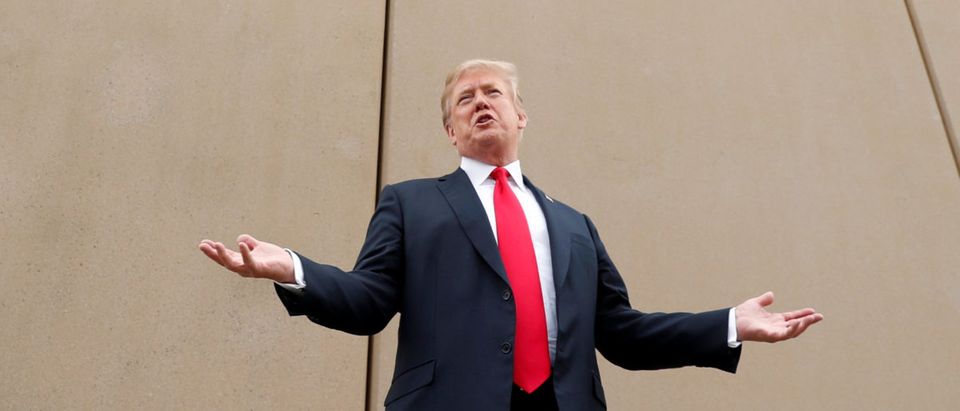Republican Sen. Lindsay Graham of South Carolina has warned Donald Trump that if he gives in on his demand for a border wall to reopen the government, “that’s probably the end of his presidency.” Graham is wrong. By keeping the government closed as a bargaining chip for his border wall, Trump is undermining the American economy and jeopardizing his chances for reelection in 2020.
The folly of Trump’s strategy is disclosed by the Keys to the White House, a historically based prediction system that I developed in 1981 in collaboration with Vladimir Keilis-Borok, one of the world’s leading mathematicians. We based our model on the retrospective study of all American presidential elections from 1860 to 1980. The model has since that successfully predicted the results of all 9 American presidential elections from 1984 to 2016, often years in advance of the election.
The model is based upon the proposition that presidential elections largely turn on the strength and performance of the party holding the White House. To give specificity to this insight, the model identifies 13 true/false questions (or “keys”) that gauge primarily the strength and performance of the party holding the White House. When the answers to five or fewer of these questions are false, the incumbent party wins. When six or more are false, the challenging party wins.
Currently, the incumbent Republicans have lost or will almost surely lose four of the thirteen keys.
- The party’s losses in the House elections have cost it the mandate (the first key), which is measured solely by the results of House contests.
- The escalating scandals will surely cost the Republicans the scandal key (the ninth key).
- The lack of any well-recognized foreign policy triumph forfeits foreign/military success (the 11th key).
- Although Donald Trump appeals passionately to a minority of the American people, he lacks broad across-the-board appeal necessary to secure the Incumbent charisma/national hero (the 12th key).
Any further extension of the government shutdown risks plunging the economy into a downtown that could well last into the election year, costing the White House party the short-term economy (the fifth key). That would end Trump’s two-key cushion and put him within a single key of a predicted defeat in 2020. Any additional setback would cost him the presidency: a significant primary challenge within his own party (the second key), the rise of a major third party candidates (the fourth key), a foreign policy disaster (the 10th key), or the nomination by the Democrats of a charismatic candidate (the 13th key), the only key under the control of the challenging party. And a sour economy would up the chances of a primary challenge or a third-party movement.
The economic costs of an extended shutdown are real and compelling. According to Kevin Hassett, the chair of the president’s Council of Economic Advisers, the shutdown slashes quarterly economic growth by 0.13 percentage points every week that it continues. The negative economic impact will likely continue well beyond the reopening of government, with consumers and businesses losing faith in the capacity of the president and Congress to govern effectively. Add to that a slowdown in global economic growth and the effects of the trade war with China, and the economy could well suffer from an election-year recession.
You don’t have to buy into the Keys to the White House to understand that a recession in 2020 would likely cost Trump his reelection. A good economy is not guarantee of victory for the White House party, but a bad one is an almost certain harbinger of defeat. Not once since President Herbert Hoover lost to Franklin Roosevelt during the Great Depression in 1932 has the party controlling the White House gained reelection during an election-year recession, whether or not the incumbent president is running again.
Subsequent examples of incumbent party defeats include 1960, 1980, 1992, and 2008. According to the National Bureau of Economic Research, the recession that began in 1990 had technically ended before 1992, but the bureau did not reach this conclusion until seven weeks after the election. A nationwide Los Angeles Times Poll taken ten days before the 1992 election showed that 76 percent Americans believed that the economy remained in recession.
Trump may not understand technical economic analysis, but he does understand politics. Why then would he continue to pursue a shutdown strategy that threatens his own political future. One chilling answer is that he is indeed working on behalf of the Russians. The person who benefits the most from having the American government in shutdown and its politics in gridlock is Vladimir Putin. Putin is surely passing around the celebratory vodka in the Kremlin, especially now that President Trump is lifting sanctions on his oligarch buddy, Oleg Deripaska.
Allan J. Lichtman (@AllanLichtman) is distinguished professor of history at American University in Washington, D.C.
The views and opinions expressed in this commentary are those of the author and do not reflect the official position of The Daily Caller.


